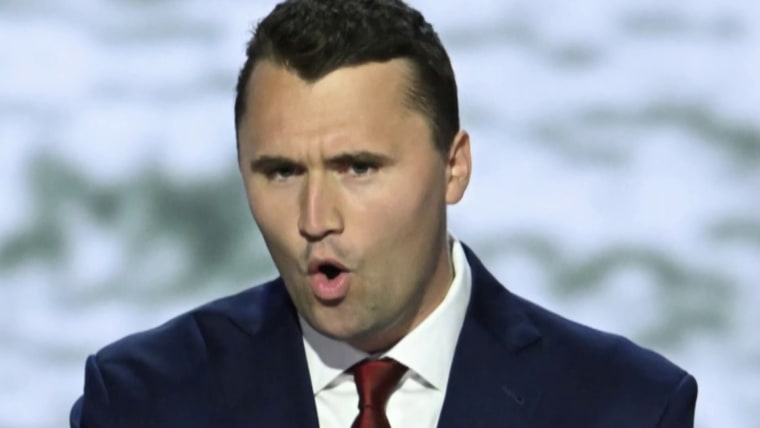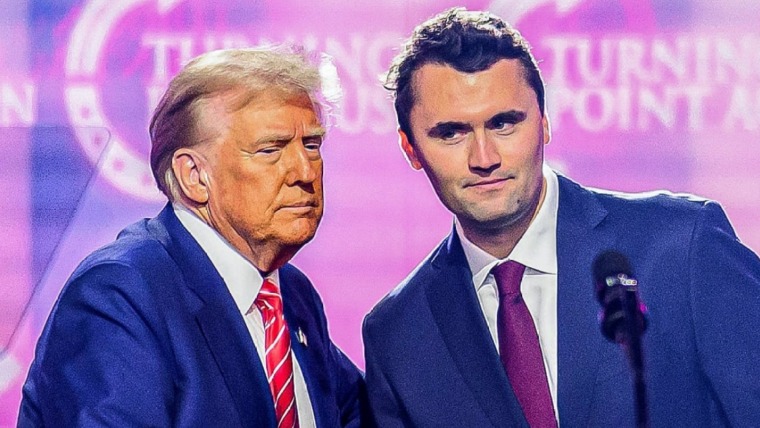UPDATE (Sept. 12, 2025; 9:12 a.m. ET) NBC News reports the suspect arrested and accused of killing Charlie Kirk has been identified as 22-year-old Utah man Tyler Robinson.
UPDATE (Sept. 12, 2025; 9:05 a.m. ET): This article has been updated to reflect developments following the arrest of the suspect in the shooting death of Charlie Kirk.
After the horrific killing of influential MAGA activist Charlie Kirk — who was struck down by a sniper’s bullet as he answered students’ questions at Utah Valley University on Wednesday — President Donald Trump had a rare opportunity to call for a moment of national unity. The president could have mourned his close ally, who was a 31-year-old husband and father, a highly effective unofficial adviser to Trump’s administration and a popular leader of a mass movement of young conservatives. And he could have taken the opportunity to denounce violence emanating from any spot on the political spectrum.
Instead, Trump saw another opportunity: to squarely lay the blame for Kirk’s murder on the media and his political opponents.
We know facts don’t matter to Trump. What’s important to him is having enemies to blame and punish.
The president posted a roughly four-minute video from the Oval Office, during which he paid tribute to Kirk’s career and life as a young family man. But then he made wildly irresponsible assumptions about the then-unknown suspected killer’s motives. He completely ignored right-wing violence (like the kind he incited in Washington on Jan. 6, 2021), and he explicitly threatened to bring down the force of government on his political opponents.
Trump said “all Americans and the media” must “confront the fact that violence and murder are the tragic consequence of demonizing those with whom you disagree day after day, year after year, in the most hateful and despicable way possible.” He added, “For years, those on the radical left have compared wonderful Americans like Charlie to Nazis and the world’s worst mass murderers and criminals,” and he blamed “this kind of rhetoric” as being “directly responsible for the terrorism that we’re seeing in our country today.”
So far, none of this is out of character for Trump. While lamenting Kirk’s killing as the “tragic consequence of demonizing those with whom you disagree day after day,” Trump ignored his own statements referring to immigrants as “vermin,” calling the media the “enemy of the American people” and saying he hates Democrats, whom he also on different occasions referred to as “evil” and “demonic.” But Trump’s hypocrisy and serial deployment of violent rhetoric are such a part of his character that Americans — both supporters and detractors of the president — are mostly inured to it.

What was most notable — and disturbing — in Trump’s video statement is that he sees himself as the avenger of Kirk’s killing. And though there’s no indication he had any insight into what motivated the shooter, while avoiding specifics, he telegraphed whom he holds responsible: “My administration will find each and every one of those who contributed to this atrocity and to other political violence, including the organizations that fund it and support it, as well as those who go after our judges, law enforcement officials and everyone else who brings order to our country.”
Some of Trump’s most influential supporters also made wild accusations in the immediate aftermath. To cite just a few, Trump’s unofficial “loyalty enforcer,” anti-Islam activist Laura Loomer, posted, “They sent a trained sniper to assassinate Charlie Kirk”; the richest man in the world, Elon Musk, opined, “The Left is the party of murder”; and right-wing activist Christopher Rufo declared, “It is time, within the confines of the law, to infiltrate, disrupt, arrest, and incarcerate all of those who are responsible for this chaos.”
As I wrote this week, Trump has made it no secret that he’s itching to use brute force to go after his political opponents or anyone he deems undesirable. We would be foolish to dismiss Trump’s words as oh-so-much bluster. And as I’ve written repeatedly since he has been back in power, second-term Trump doesn’t issue idle threats, nor does he have any regard for the rule of law or constitutional limits on his power.
Trump has made it no secret that he’s itching to use brute force to go after his political opponents or anyone he deems undesirable.
It’s too early to know whom Trump intends to hold responsible for Kirk’s killing. But there was no guarantee a clear motive would ever be determined (as was the case with the 20-year-old who killed a bystander in his attempt to assassinate Trump in Butler, Pennsylvania, in July 2024). And even if the suspected killer's motive wasn’t what Trump and his allies assumed it was, there’s no reason to believe Trump would stand down on his attacks blaming his political opposition for Kirk’s tragic death.
We know facts don’t matter to Trump. What’s important to him is having enemies to blame and punish. Charlie Kirk’s murder is a horrible moment for America and the most profound loss imaginable for his family. It could have been a moment for the president to shock the world by demonstrating some basic universal humanity. But that’s not Trump, who seems determined to exploit this tragedy to stoke rage and use his increasingly unrestrained power to tamp down on dissent.

